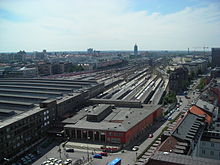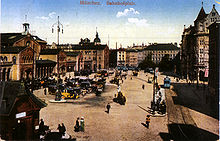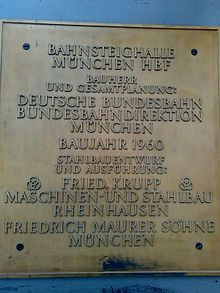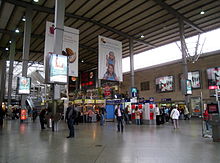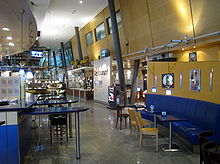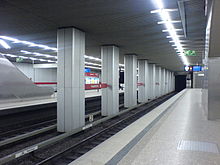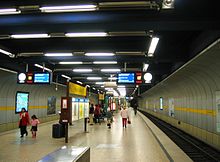- Munich Central Station
-

München Hauptbahnhof Munich Central Station Operations Category 1 Type Bf Platforms in use 32 above ground, 2 S-Bahn, 6 U-Bahn Daily entry/exit 350,000[1] DS100 code MH Construction and location Opened 1839 (rebuilt 1960) Location Munich State Bavaria Country Germany Local authority Ludwigsvorstadt-Isarvorstadt 48°04′58″N 11°19′54″E / 48.0827°N 11.3318°E Bayerstraße, 80335 München Route information - Munich–Ingolstadt (KBS 900, 901, 990)
- Munich–Landshut (KBS 930, 931)
- Munich–Mühldorf (KBS 940)
- Munich–Salzburg (KBS 951)
- Bayerische Oberlandbahn (KBS 955, 956, 957)
- Munich–Garmisch-Partenkirchen (KBS 960)
- Allgäu Railway (KBS 970)
- Munich–Augsburg (KBS 980)
- S-Bahn S1, S2, S3, S4, S6, S7, S8, S27
- U-Bahn U1, U2, U4, U5
- Tram 16, 17, 18, 19, 20, 21
List of railway stations in Bavaria Munich Central Station (German: München Hauptbahnhof) is the main railway station of the city of Munich in Germany. It is one of the three long distance train stations in Munich, the others being München-Pasing and München Ost. The station sees about 350,000 passengers a day, which puts it on par with other large stations in Germany, such as Hamburg and Frankfurt (Main) Hbf. The mainline station is a terminal station, the subterranean S-Bahn and U-Bahn stations are through stations.
Contents
History
The current site, then situated outside the city walls, saw the first railway station in 1839, with the line from Munich to Lochhausen opening on September 1. On October 4, 1840, the Lochhausen line was extended to Augsburg. This first station was short-lived, however, as it fell victim to a fire on April 4, 1847.
The station was rebuilt from 1847 to 1849 as the Centralbahnhof according to plans by Friedrich Bürklein and reopened on September 22, 1849. Further lines were soon added to the station; to Landshut (in 1858), Nuremberg in (1859) and Rosenheim in (1871). In order to cope with the new levels of traffic, the station saw a major rebuild from 1876 to 1884.
In 1893, an outlying station was added to accommodate trains for the line to Starnberg. Another set of tracks was added at the opposite end of the station for trains to Holzkirchen in 1915.
The station was renamed München Hauptbahnhof in 1904. It sustained heavy damage from allied bombing in 1945 and the damaged train shed was torn down in 1949. From 1958 to 1960, the station was rebuilt integrating parts of the old station. The new train shed was built in a contemporary 1960s style by Krupp, spanning tracks 11 to 26.
From 1967 onwards, the S-Bahn (subway) tunnels and the München Hbf (tief) station which serves them were built underneath the station, opening on April 28, 1972, just before the 1972 Summer Olympics. The U-Bahn stations were opened in 1980 and 1984.
Current
The construction of a second S-Bahn route (a second main tunnel route through the center of Munich) with a new S-Bahn station is being planned for the station hall. Because of challenges with the planning and financing of the route, it will probably not be finished until 2020.
A new front for the railway station and service hall are to built to a design by Auer+Weber+Assoziierte. Because of difficulties in financing, it is questionable when the project will be started.[2]
A Transrapid route to Munich Airport was under consideration for some time and intended to be operational around 2011. However the project never reached construction phase due to skyrocketing costs caused by increasing prices for steel and other materials. It was finally suspended when cost estimates reached €3.2 billion, up from an original estimate of €1.85 billion.
Station layout
Apart from Lindau Hauptbahnhof, München Hauptbahnhof is the only major terminal station in Bavaria. There are 32 tracks, split over the original three stations:
- Holzkirchner Bahnhof,München Hbf Gleis (tracks) 5-10
- Hauptbahnhof (main train shed)
- Starting and ending point for all InterCityExpress (ICE), Intercity (IC)/EuroCity (EC) long-distance services and DB NachtZug and CityNightLine services. RegionalExpress and RegionalBahn services also depart from here to Augsburg, Ingolstadt and Landshut, among other directions.
- Starnberger Bahnhof (München Hbf Gleis (tracks) 27-36)
- Services call here for Lindau and Garmisch-Partenkirchen. Trains operated by Bayerische Oberlandbahn and Allgäu-Express depart from here as well. The S-Bahn line
 departs from this part of the station to Deisenhofen. In case of a closure of the S-Bahn tunnel below the station, some westbound S-Bahn services will depart from the Starnberger Bahnhof.
departs from this part of the station to Deisenhofen. In case of a closure of the S-Bahn tunnel below the station, some westbound S-Bahn services will depart from the Starnberger Bahnhof.
The subterranean Munich S-Bahn station is separated operationally from the mainline station and known as München Hbf (tief). To optimise passenger flow, separate platforms for entering and disembarking trains exist. The subway station is situated near the U-Bahn lines for the U1 and U2 trains, but if one wishes to change from the S-Bahn to U4/U5 trains, it is more practical to stay on the S-Bahn to Karlsplatz (Stachus), as the U4/U5 station is on the opposite side of the station.
Due to the station's size, walking from one platform to another may take a considerable amount of time. Deutsche Bahn recommends planning for a minimum walking time of 10 minutes from the central hall to Starnberger Bahnhof or Holzkirchner Bahnhof; 15 minutes between Starnberger and Holzkirchner Bahnhof; and 15 minutes between the S-Bahn station and Holzkirchner Bahnhof.
The two outlying parts of the station have shorter tracks than the main hall, which means passengers always have to walk down most of the length of either platform 11 or 26 when changing from there. Unlike Frankfurt Hbf, there is no passenger subway under the tracks.
The mainline station is only closed between 1:30 and 3:00. The S-Bahn stations operate almost 24/7, and the U-Bahn station closes only between 1:30 and 4:00 (2:30-4:00 on weekends).
Station services
Trains
Long distance
The station is the southern point of the InterCityExpress line to Hamburg-Altona via the Hanover-Würzburg high-speed rail line. It also has frequent links to Dortmund via Frankfurt and Cologne using the Cologne-Frankfurt high-speed rail line. The most recent addition is the Nuremberg-Ingolstadt high-speed rail line, which has greatly benefited from Munich traffic. Additional ICE services using mainly ordinary lines on their run exist to Vienna, Berlin and a number of other cities. There are also numerous InterCity and EuroCity services to most parts of Germany as well as neighbouring Austria, Switzerland, France and Italy. The station has a number of DB NachtZug and CityNightLine services to northern Germany, the Netherlands, Denmark, France and Italy, though facilities for the autoracks in these night services are located at München Ost railway station. Night services operated by other railway companies also can be seen at the station, for example to Moscow, Budapest or Zagreb.
Regional trains
There are numerous RegionalExpress and RegionalBahn services to Landshut, Regensburg, Plattling, Passau, Kempten, Lindau, Garmisch-Partenkirchen and Nuremberg among others. The Bayerische Oberlandbahn operates services to Bayrischzell, Lenggries and Tegernsee.
All lines are electrified, except the ones to Mühldorf, Kempten and Lindau and the lines of the Bayerische Oberlandbahn. To minimise pollution, services using these lines preferably end at tracks 5-10 and 27-36.
Local traffic
The underground S-Bahn station is on the western end of the so-called Stammstrecke tunnel underneath Munich city centre. Lines
 ,
,  ,
,  ,
,  ,
,  ,
,  and
and  call at the underground station. The trains to Altomünster (
call at the underground station. The trains to Altomünster ( ) and
) and  services depart from the Starnberger Bahnhof part of the above-ground station.
services depart from the Starnberger Bahnhof part of the above-ground station.Two U-Bahn stations are connected to the railway station - one situated in the -4 level underneath the station square, where
 and
and  north-south services call on four tracks, one at the southern side of the station hall, with the
north-south services call on four tracks, one at the southern side of the station hall, with the  and
and  east-west lines calling.
east-west lines calling.There are also four stops of the Munich tramway in the vicinity of the station, called Hauptbahnhof, Hauptbahnhof Nord, Hauptbahnhof Süd and Holzkirchner Bahnhof. These stops are served by routes
 ,
,  ,
,  ,
,  ,
,  and
and  .[3]
.[3]Facilities at the station
The eastern part of the main hall features shops and a small food hall. There are also several smaller kiosks in the station hall, selling snacks and newspapers. The access level to the U-Bahn and S-Bahn stations has a full-featured shopping mall and provides undercover access to nearby department stores.
Preceding station DB AG Following station toward Berlin OstbahnhofICE 11 Terminus toward Paris EstICE 83 Terminus References
- ^ ' "Bindeglied zwischen Süd- und Osteuropa (Link to Southern and Eastern Europe)" (in German). Deutsche Bahn. http://www.bahnhof.de/site/bahnhoefe/de/sued/muenchen__hbf/daten__und__fakten/daten__und__fakten__.html '. Retrieved 22 February 2010.
- ^ Hutter, Dominik (2007-05-04). "Doch kein neuer Bahnhof?". Süddeutsche Zeitung. http://www.sueddeutsche.de/muenchen/414/366232/text/. Retrieved 2010-01-03.
- ^ "Munich tram network". MVG. http://www.mvg-mobil.de/netzplaene/images/tramnetz.pdf. Retrieved 20 June 2011.
External links
 Media related to München Hauptbahnhof at Wikimedia Commons
Media related to München Hauptbahnhof at Wikimedia CommonsPreceding station Munich S-Bahn Following station toward Wolfratshausen, Tutzing, Herrsching,
Geltendorf, Mammendorf,
Petershausen, Freising or AirportStammstrecke toward DeisenhofenS27 Terminus Categories:- Railway stations in Munich
- Buildings and structures in Munich
- Hauptbahnhof
- Munich U-Bahn stations
- Munich S-Bahn stations
Wikimedia Foundation. 2010.

